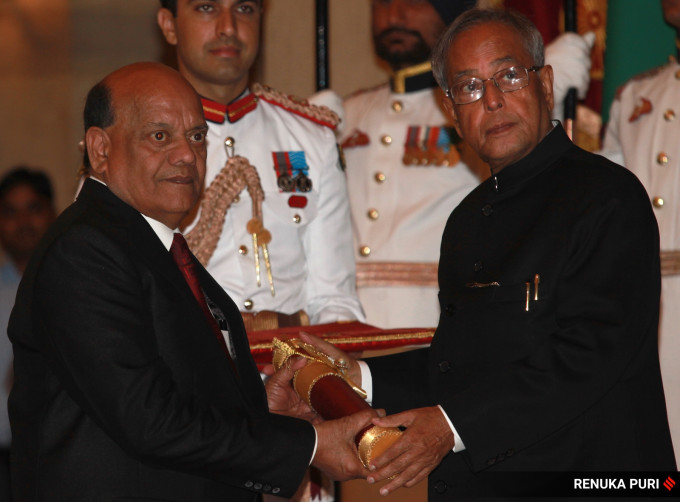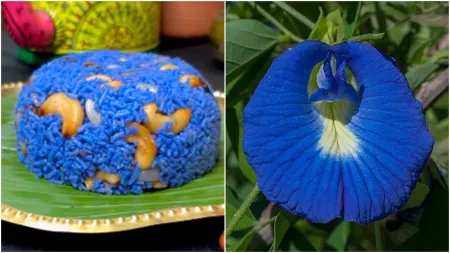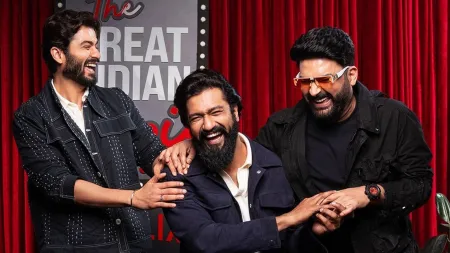Surender Sharma: ‘I started writing satirical jokes about wives 7 years before I got married’
What started in the second year of college is still going strong for popular poet and satirist Surender Sharma whose starting punchline ‘chaar lainaa suna raha hoon’ was as popular as his dry-wit humour in the ’80s and ’90s. Best known for his comic sketches about wives, the hasya kavi — even after all these years — is still working towards creating something the future generations will be proud of. “I’ve never been one to dwell on the past – the future is what excites me,” he tells indianexpress.com in an exclusive interaction.
We caught up with Sharma ahead of his performance at the Mulla Nasruddin Day celebrations at Osho Dham in New Delhi last week, to talk about his style of humour, being conferred with the Padma Shri, cracking jokes on oneself, how he feels the landscape of comedy has changed in India and why he doesn’t feel it is an “improvement”. Read the edited excerpts below:

Q. Your tryst with comic poetry/satire started when you were in college and is still going steady. How would you describe your journey?
Surender Sharma: My journey began in my second year of college, and that fire has been burning for over six decades now. I’ve never been one to dwell on the past – the future is what excites me. After all, what’s done is done, but the impact we can have is still ahead. Forget bragging rights; let’s focus on creating something future generations will be proud of.
Q. Recognising your work, the Government conferred Padma Shri on you in 2013. How does the recognition feel? Did it translate into more opportunities/a career push? Did you feel it came late or at the right time?
Sharma: The Padma Shri is a humbling honour, but I approach it with a calm heart. Surender Sharma is who I am, and that’s enough for me. There are surely countless talented artists deserving of recognition. What truly matters is the connection with my audience, their love is my greatest reward. I’m grateful to the Indian government for this prestigious recognition, but awards shouldn’t define us. It’s about staying grounded and earning recognition, not the other way around. True worth comes from within, not external validation.
Q. You are known for your comic sketches of your life with your wife. Why did you decide to base the majority of your life on your marriage?
Sharma: Ironically, I started writing satirical jokes about wives seven years before I even got married! They weren’t based on reality, but more of a funny exploration of domestic life. My father worried these jokes would scare women away, thinking I was already taken! While my material often features wives, it’s meant to be humorous, not critical. Unlike some comics today who focus on roasting others, I believe the best jokes poke fun at ourselves – that’s what truly gets people laughing.
View this post on Instagram
A post shared by Surender Sharma (@surendersharmakavi)
Q. But, making jokes about oneself and laughing along with the audience is no easy feat. Do you not find it challenging?
Sharma: Making fun of yourself is rather easy. Mocking others can be hurtful, and a good joke shouldn’t cause pain. Satires can be powerful tools. Like guardians, satirical poets can point out societal flaws and prompt reflection. While getting everyone to agree on certain experiences may not be possible, one can certainly spark awareness. Ultimately, the success of satire lies in its ability to make us laugh and think critically – that’s what makes it truly superior.
Q. Over the years, kavi sammelans and hasya kavis have undergone a massive makeover. How have you dealt with these changes? How have they affected your career and audience?
Sharma: I agree, there’s been a definite shift in comedy. Unfortunately, I don’t see it as an improvement. Satire used to be the heart of comedy, and it still can be incredibly effective. But lately, it seems like a lot of comedians rely on shock value and vulgarity to get laughs. For me, that’s not true artistry. It’s true that we’re seeing a decline in thoughtful discourse across many areas, not just comedy. Politics, journalism, religion, education – it seems like everywhere we turn, there’s less focus on substance. I believe that if we want to see things improve, we all need to make a conscious effort to be more intellectually awakened.
Q. As such, how do you view the rise of stand-up comics in India? Do you follow the work of any?
Sharma: I’m still developing my comedic voice, and I’m more interested in learning and growing than comparing myself to others. My focus is on crafting honest, relatable material and letting the audience be the judge. Their reaction is what matters most to me. How other comedians are doing doesn’t faze me; I’m here to hone my own skills and bring laughter to the table.
 Comic poet Surender Sharma receiving the Padma Shri award in the Arts category from President Pranab Mukherjee in 2013. (Express photo by Renuka Puri)
Comic poet Surender Sharma receiving the Padma Shri award in the Arts category from President Pranab Mukherjee in 2013. (Express photo by Renuka Puri)
Q. In what ways would you say, hasya kavis and stand-up artists are similar to or different from each other?
Sharma: While both satire and comedy can use humour to entertain, there’s a key difference in their creative approaches. Satirical poetry is a work of originality and pointed criticism. Satirical poets craft their own unique voice using wit, irony and exaggeration to deliver their message. Originality is crucial, as the satire relies on the poet’s fresh perspective. Comedians can be more flexible in their source material. They can use imitation, parody, and even existing jokes, reinterpreting them for their own comedic style
Q. Do you feel that you and your contemporaries had to tread within a certain territory when it came to content? Or do you feel the freedom artists have today (thanks to the internet) is being abused?
Sharma: Originality has always been a core value in my satirical work. I avoid social media to minimize external influences and focus on my own thoughts. Early on, I discovered Osho’s unique perspective on life. However, to maintain my own voice, I stopped reading his work to ensure my creations wouldn’t simply echo his ideas. For a satirical poet (hasya kavi), true ingenuity is paramount. It’s the fresh perspective and clever wordplay that truly resonate with the audience. It breaks my heart to see stand-up comedians today quarrelling over jokes, claiming credentials. But if you read closely they all have 80 per cent copied from somewhere else!
Q. Having said that, how do you think your career would have been had you started out in the age of Internet and social media?
Sharma: In my time, I’ve had the privilege of performing for massive audiences, sometimes exceeding 50,000! I vividly recall a show in a town of just 2,000 people, where an incredible 25,000 came out to see me. Back then, kavi sammelans and mushayras were the primary source of entertainment. While everything is readily available at home now, it seems live events often cater primarily to those who can’t access online content. There is an undeniable magic to connecting with a live audience. The energy exchange, the shared laughter and emotion – it’s simply irreplaceable. Performing for a room devoid of people just wouldn’t be the same.
Even performing abroad, I managed to draw large crowds without the benefit of social media or the internet. Back then, people were genuinely interested in the art form, staying captivated for hours, sometimes extending to early mornings the next day! Shows garnered substantial ticket sales, reflecting the genuine appreciation for the art. Today’s focus on digital recording in studios doesn’t quite hold the same appeal for me. The raw connection with a live audience is what truly fuels my passion.
Disclaimer: The copyright of this article belongs to the original author. Reposting this article is solely for the purpose of information dissemination and does not constitute any investment advice. If there is any infringement, please contact us immediately. We will make corrections or deletions as necessary. Thank you.





